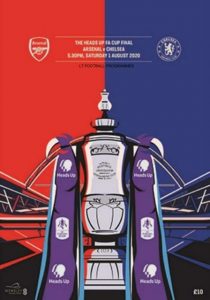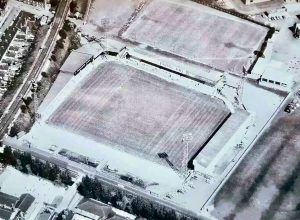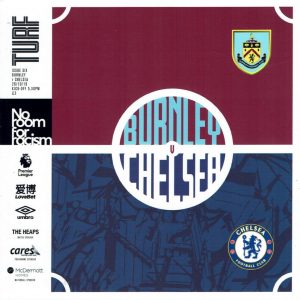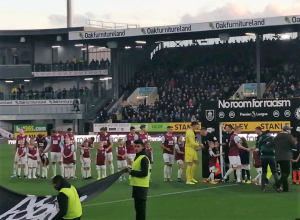With the new Premier League season just around the corner and a host of familiar and new players gracing the league, there’s plenty of stories to be written, metaphorically and literally. Here, we take a look at each club and pick an already published autobiography from a player of the Premier League era that’s worth a read and one from the current crop that would appeal.
Arsenal
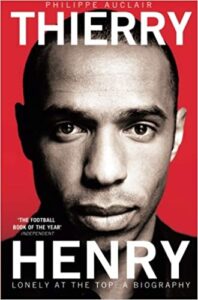 Past: Arsenal have had some mighty fine players in the Premier League era and some mighty memorable personalities too – a number of which have made their mark in the publishing world. Legends like Sol Campbell, Ian Wright and Dennis Bergkamp have put pen to paper, although, perhaps Arsenal’s greatest Premier League player, Thierry Henry, has never done so, with just Philippe Auclair’s biography, Thierry Henry: Lonely At The Top available so far. Last year also saw the man who led Arsenal for 26 seasons in the top flight and revolutionise the club, not least in shaping the 03/04 Invincibles, Arsene Wenger, publish his first book, My Life in Red And White, and a startlingly frank memoir from cult hero Nicklas Bendtner, Both Sides. Although not autobiography, looking forward, there’s also an exciting project on the horizon which sees Ian Wright’s debut novel for younger readers, Striking Out, published in September. But, as legends go, they don’t come much greater than Tony Adams and two notable autobiographies have been penned with Ian Ridley; the first Addicted in 1998 and the second Sober in 2018 – the titles of which tell you all you need to know about Adams’ battles on and off the pitch.
Past: Arsenal have had some mighty fine players in the Premier League era and some mighty memorable personalities too – a number of which have made their mark in the publishing world. Legends like Sol Campbell, Ian Wright and Dennis Bergkamp have put pen to paper, although, perhaps Arsenal’s greatest Premier League player, Thierry Henry, has never done so, with just Philippe Auclair’s biography, Thierry Henry: Lonely At The Top available so far. Last year also saw the man who led Arsenal for 26 seasons in the top flight and revolutionise the club, not least in shaping the 03/04 Invincibles, Arsene Wenger, publish his first book, My Life in Red And White, and a startlingly frank memoir from cult hero Nicklas Bendtner, Both Sides. Although not autobiography, looking forward, there’s also an exciting project on the horizon which sees Ian Wright’s debut novel for younger readers, Striking Out, published in September. But, as legends go, they don’t come much greater than Tony Adams and two notable autobiographies have been penned with Ian Ridley; the first Addicted in 1998 and the second Sober in 2018 – the titles of which tell you all you need to know about Adams’ battles on and off the pitch.
Present: Arsenal haven’t perhaps had quite the wealth of big-name talent in recent years as they more traditionally have had in the Premier League era, but with Ben White’s arrival this summer and the emergence of some young guns, with the likes of Emile Smith Rowe and Gabriel Martinelli, there’s plenty to look out for from the Gunners. When it comes to penning their life story, captain and talisman Pierre-Emerick Aubameyang would seem like an obvious choice that would surely be full of the goalscorer’s infectious personality. Elder statesmen Willian and Granit Xhaka would also have interesting journeys to share, while despite being only nineteen, Bukayo Saka has already written an impressive entry into Arsenal and England’s history books. But my choice for Arsenal autobiography would be Arsenal’s current longest-serving player, Hector Bellerin, who has not only entered his tenth year at the club and been around in a changing era at the North London side, but who is also an eloquent and passionate speaker on a number of subjects beyond football.
Aston Villa
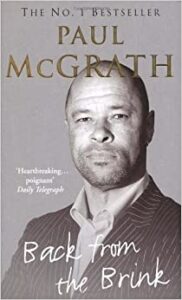 Past: In the first ever Premier League season, Aston Villa finished second – it proved to be their highest-ever finish in the new top flight as subsequent seasons, and particularly more recent years, have been more down than up. Yet, Villa Park has been graced by some genuine quality and a few iconic cult heroes in the three decades of the Premier League. Surprisingly, though, few of these have had their stories put down on paper. Indeed, the likes of Villa stalwarts such as Mark Bosnich, Ian Taylor and Dean Saunders remain absent from the bookshelves, as do unexpected heroes like John Carew, Savo Milosevic and Juan Pablo Angel. In fact, only a couple of Villa players have autobiographies to their name, including nineties legend Paul McGrath, whilst more recent icon, Stiliyan Petrov, published his autobiography in 2005, prior to his move from Celtic to the West Midlands. So it’s sadly slim pickings, so I’m going to suggest three past players who publishers should consider for future autobiographies: Gareth Barry, who remains top of Villa’s most EPL appearances chart; Lee Hendrie, who rose up the ranks at his local club; and Dion Dublin, who needs no introduction.
Past: In the first ever Premier League season, Aston Villa finished second – it proved to be their highest-ever finish in the new top flight as subsequent seasons, and particularly more recent years, have been more down than up. Yet, Villa Park has been graced by some genuine quality and a few iconic cult heroes in the three decades of the Premier League. Surprisingly, though, few of these have had their stories put down on paper. Indeed, the likes of Villa stalwarts such as Mark Bosnich, Ian Taylor and Dean Saunders remain absent from the bookshelves, as do unexpected heroes like John Carew, Savo Milosevic and Juan Pablo Angel. In fact, only a couple of Villa players have autobiographies to their name, including nineties legend Paul McGrath, whilst more recent icon, Stiliyan Petrov, published his autobiography in 2005, prior to his move from Celtic to the West Midlands. So it’s sadly slim pickings, so I’m going to suggest three past players who publishers should consider for future autobiographies: Gareth Barry, who remains top of Villa’s most EPL appearances chart; Lee Hendrie, who rose up the ranks at his local club; and Dion Dublin, who needs no introduction.
Present: Before this month, there was just one man who would have been at the top of fans’ lists in terms of a Villa autobiography – Jack Grealish, but despite Manchester City having put the kibosh on that, there’s still some great and perhaps even more worthy candidates available. With Danny Ings and Ashley Young arriving at Villa Park this summer, they’ve both got substantial journeys to share, whilst John McGinn’s story began in St Mirren before marking his mark at Hibernian and latterly the Midlands club. However, few players have had quite the journey of England’s Tyrone Mings, who spent eight years in the academy at Southampton before his senior career saw him start not at the dizzy heights of the Premier League but at non-League Yate Town. A move to Southern League Premier Division Chippenham followed, before he made his League football bow with Ipswich Town. The Premier League beckoned following a move to Bournemouth in 2015, before he really made his mark at Villa and stepped up for the Three Lions.
Brentford
 Past: As we head into the 2021/22 season, Brentford are the only team never to have previously played in the Premier League since its inception in 1992, having bounced around the old Second and Third Division, League One and League Two and spent the last seven seasons in the Championship, coming close to promotion in 2019/20, before securing their spot in the top flight last season. There are, unsurprisingly, therefore few books charting Brentford players past, although Greville Waterman has penned a couple of tomes on the club and its players, while The Official Brentford Book of Griffin Park was released in 2019, to mark their move from the stadium the Bees have called home for over 100 years. There’s rich pickings then for any wannabe authors out there or publishers who want to fill the Brentford gaps on the bookshelves.
Past: As we head into the 2021/22 season, Brentford are the only team never to have previously played in the Premier League since its inception in 1992, having bounced around the old Second and Third Division, League One and League Two and spent the last seven seasons in the Championship, coming close to promotion in 2019/20, before securing their spot in the top flight last season. There are, unsurprisingly, therefore few books charting Brentford players past, although Greville Waterman has penned a couple of tomes on the club and its players, while The Official Brentford Book of Griffin Park was released in 2019, to mark their move from the stadium the Bees have called home for over 100 years. There’s rich pickings then for any wannabe authors out there or publishers who want to fill the Brentford gaps on the bookshelves.
Present: Brentford arguably have one of the best alumni in recent years, with the likes of Neal Maupay, James Tarkowski and Ollie Watkins all making the move from the West London club to the Premier League, and the Bees now have a squad all ready to step on to the biggest domestic stage in football, but one of the standout performers last time out was centre-forward, Ivan Toney, who was League One’s top scorer in 2019/20, before backing that up by becoming the Championship’s top scorer last season in his first campaign for Brentford. In some 45 appearances, Toney, who started his journey at Northampton Town, becoming the side’s youngest player, scored 31 times. His move from Northampton to Newcastle United failed to bear fruit, with Toney being sent out on loan lower down the football pyramid, variously at Barnsley, Shrewsbury Town, Scunthorpe United, and Wigan Athletic, before his move to Peterborough in 2018. Just three seasons on, Toney finds himself, still only 25, finally having his shot at the big time and going on past performances it would be unwise to count him out.
Brighton & Hove Albion
 Past: When the Premier League kicked off in earnest, Brighton and Hove Albion were struggling in Division 2, before a period in Division 3. Their fortunes seemed to turn with the new millennium, but as near back as 2011, they were still competing in League One. A few years in the Championship culminated in 2017 in their first promotion to the Premier League, and since then they haven’t looked back. The Premier League era has seen some stalwarts at the South Coast side, but none of these, including second on Brighton’s goalscoring charts, Glenn Murray, and joint sixth, Bobby Zamora, as well as talisman Bruno, have turned their journeys into books so far. The club’s leading goalscorer, Tommy Cook, who was also notable for being a first-class cricketer for Sussex way back in the 1920s and 1930s, was memorialised earlier this year in Tommy Cook: The Double Life of Superstar Sportsman, but for a more recent tome, albeit prior to the Premier League era, the autobiography of Brian Horton, who both played and managed at Brighton stands out.
Past: When the Premier League kicked off in earnest, Brighton and Hove Albion were struggling in Division 2, before a period in Division 3. Their fortunes seemed to turn with the new millennium, but as near back as 2011, they were still competing in League One. A few years in the Championship culminated in 2017 in their first promotion to the Premier League, and since then they haven’t looked back. The Premier League era has seen some stalwarts at the South Coast side, but none of these, including second on Brighton’s goalscoring charts, Glenn Murray, and joint sixth, Bobby Zamora, as well as talisman Bruno, have turned their journeys into books so far. The club’s leading goalscorer, Tommy Cook, who was also notable for being a first-class cricketer for Sussex way back in the 1920s and 1930s, was memorialised earlier this year in Tommy Cook: The Double Life of Superstar Sportsman, but for a more recent tome, albeit prior to the Premier League era, the autobiography of Brian Horton, who both played and managed at Brighton stands out.
Present: Brighton have been a team that have caught many an eye since their promotion to the Premier League four seasons ago and have quality in abundance, in both young, up-and-coming talent and experienced pros. One-man-club and current captain Lewis Dunk would be an obvious starting point for a Brighton autobiography, but there’s plenty of other names in the running. Youngsters Tariq Lamptey and Yves Bissouma are ones who are at the beginning of their journeys but certainly worth keeping an eye out for, whilst Percy Tau’s story takes him from South Africa to Brighton with time spent in Belgium. For their wealth of experience, though, it is hard to look past Danny Welbeck and Adam Lallana, and whilst Welbeck has perhaps had the slightly more varied journey via Manchester United, Preston North End, Sunderland, Arsenal and Watford, Lallana’s successes on the European stage with Liverpool top his story off with Champions League and Club World Cup success.
Burnley
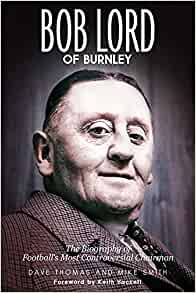 Past: Like Brentford and Brighton before them, Burnley were well out of the Premier League reckoning when it all kicked off in 1992. Bouncing around Division 1 and 2 throughout the nineties, the new millennium saw them consolidate in Division 1, latterly the Championship, before making the final step up the pyramid to the Premiership via the play-off in 2009. It was but the briefest of stays and was repeated in 2013/14 when the Clarets were once more promoted only to be relegated after their first season back at the top. However, since winning the Championship in 2016, Burnley have become a mainstay of England’s top league. Dave Thomas has been at the forefront of charting Burnley’s recent past, including Champions: How Burnley won promotion 2015/2016 and a biography of Bob Lord of Burnley, described as football’s most controversial chairman. So when it comes to the players, it’s another Dave Thomas offering that is worth a look – Paul Weller’s Not Such a Bad Life.
Past: Like Brentford and Brighton before them, Burnley were well out of the Premier League reckoning when it all kicked off in 1992. Bouncing around Division 1 and 2 throughout the nineties, the new millennium saw them consolidate in Division 1, latterly the Championship, before making the final step up the pyramid to the Premiership via the play-off in 2009. It was but the briefest of stays and was repeated in 2013/14 when the Clarets were once more promoted only to be relegated after their first season back at the top. However, since winning the Championship in 2016, Burnley have become a mainstay of England’s top league. Dave Thomas has been at the forefront of charting Burnley’s recent past, including Champions: How Burnley won promotion 2015/2016 and a biography of Bob Lord of Burnley, described as football’s most controversial chairman. So when it comes to the players, it’s another Dave Thomas offering that is worth a look – Paul Weller’s Not Such a Bad Life.
Present: There are some absolute stalwarts to choose from when picking a future Burnley autobiography. The man at the top, by which I mean Sean Dyche, who is starting his ninth season in charge of the club, surely is in the reckoning and is someone who makes for a good listen. When it comes to the players, Ben Mee and Ashley Barnes are amongst the longest-serving on the current roster, whilst Jay Rodriguez is back at his hometown club after an initial spell from 2007 to 2012, before moves to Southampton and West Brom. At 36, Phil Bardsley’s journey has taken him from the Manchester United academy to loans in Antwerp, Rangers, Villa and Sheffield United, before moves to Sunderland and Stoke preceded his switch to Burnley. But Chris Wood has without doubt made the greatest journey, literally, from Ohehunga Sports in New Zealand as a junior, firstly to West Brom, with loan spells at everyone from Barnsley to Millwall, before moves to Leicester, then Leeds and finally, in 2017, Burnley. Wood is one of only six New Zealanders to have played in England’s top flight.
Chelsea
 Past: Last year’s Champions League winners have been Premier League mainstays since its first season, winning the league title five times with some of the biggest names in football, from Anelka to Zola. Whilst there have been some high-profile Chelsea autobiographies to date, including Dennis Wise’s memoir, John Terry’s My Winning Season and Frank Lampard’s Totally Frank, there are some obvious omissions, including Gianfranco Zola. Claude Makelele and Marcel Desailly both penned autobiographies, but these haven’t been published in English, whilst there are a number of pre-Premier League reads available, including Bobby Tambling’s Goals in Life and Kerry Dixon’s Up Front. But for a Premier League icon, you don’t have to look much further than Didier Drogba’s 2015 autobiography Commitment. Drogba is one of just 29 players to have scored over a century of Premier League goals and is Chelsea’s fourth-highest goalscorer of all time and greatest overseas striker. He is also the third most capped Ivory Coast player and their top scorer. Whilst at Chelsea, he won the gamut of Premier League, FA Cup, League Cup, Community Shield and Champions League.
Past: Last year’s Champions League winners have been Premier League mainstays since its first season, winning the league title five times with some of the biggest names in football, from Anelka to Zola. Whilst there have been some high-profile Chelsea autobiographies to date, including Dennis Wise’s memoir, John Terry’s My Winning Season and Frank Lampard’s Totally Frank, there are some obvious omissions, including Gianfranco Zola. Claude Makelele and Marcel Desailly both penned autobiographies, but these haven’t been published in English, whilst there are a number of pre-Premier League reads available, including Bobby Tambling’s Goals in Life and Kerry Dixon’s Up Front. But for a Premier League icon, you don’t have to look much further than Didier Drogba’s 2015 autobiography Commitment. Drogba is one of just 29 players to have scored over a century of Premier League goals and is Chelsea’s fourth-highest goalscorer of all time and greatest overseas striker. He is also the third most capped Ivory Coast player and their top scorer. Whilst at Chelsea, he won the gamut of Premier League, FA Cup, League Cup, Community Shield and Champions League.
Present: Though he moved on to pastures new this summer, Olivier Giroud’s forthcoming autobiography is already in the pipeline and scheduled for release next month, but who else in the Blues’ ranks would have plenty to bring to an autobiography? From current Euros winners to World Cup Winners, there are a host of contenders, not least the Selecao’s captain, Thiago Silva, whose former teams span six countries and include Fluminense, AC Milan and PSG, and who has won trophies in four countries, including the Copa de Brasil, Serie A, Ligue 1 and Champions League, as well as the Confederations Cup and Copa America for his national team. It would take some beating to surpass Thiago’s incredible journey… Step up, N’Golo Kante. The French midfield marvel is one of only six – yes, six – players to have won the triumvirate of Premier League, Champions League and World Cup. (The other five, worth noting for your next quiz night – Fabian Barthez, Juliano Belletti, Pedro, Gerard Pique and Thierry Henry.) Yet despite his successes, Kante hasn’t gone big time. Indeed, away from the pitch, he tends to go under the radar, and that makes fans love him all the more.
Crystal Palace
 Past: As Crystal Palace head into the new season, it’s all change at the top, with Roy Hodgson stepping away and Patrick Vieira taking up the reins for his first term in charge in the Premier League, and they’ll be big shoes to fill after the former England man made Palace a firm Premier League outfit. Whilst the Eagles were part of the Premier League from the get-go, they hold the dubious honour of being one of the three teams to be relegated in that inaugural season (quiz-goers out there, two points if you were able to name Middlesbrough and Notts Forest as the other two teams to fall), and despite briefly yo-yoing back to the top flight, the majority of the nineties and noughties were spent in Division 1/Championship. In 2013, however, Crystal Palace once again returned to England’s top division and have stayed there ever since. When it comes to autobiographies, Vince Hilaire’s autobiography published in 2018 offers a pre-Premier League take, whilst Mark Bright’s My Story similarly just misses out on the new era but both are ones to look out for. For something a bit different though, and to get another side of the Premier League story, Simon Jordan’s Be Careful What You Wish For was a finalist for both the William Hill Sports Book of the Year and shortlisted for the British Sports Book Award for best autobiography. And surely Sky Sports pundit Clinton Morrison’s memoir can’t be too far off.
Past: As Crystal Palace head into the new season, it’s all change at the top, with Roy Hodgson stepping away and Patrick Vieira taking up the reins for his first term in charge in the Premier League, and they’ll be big shoes to fill after the former England man made Palace a firm Premier League outfit. Whilst the Eagles were part of the Premier League from the get-go, they hold the dubious honour of being one of the three teams to be relegated in that inaugural season (quiz-goers out there, two points if you were able to name Middlesbrough and Notts Forest as the other two teams to fall), and despite briefly yo-yoing back to the top flight, the majority of the nineties and noughties were spent in Division 1/Championship. In 2013, however, Crystal Palace once again returned to England’s top division and have stayed there ever since. When it comes to autobiographies, Vince Hilaire’s autobiography published in 2018 offers a pre-Premier League take, whilst Mark Bright’s My Story similarly just misses out on the new era but both are ones to look out for. For something a bit different though, and to get another side of the Premier League story, Simon Jordan’s Be Careful What You Wish For was a finalist for both the William Hill Sports Book of the Year and shortlisted for the British Sports Book Award for best autobiography. And surely Sky Sports pundit Clinton Morrison’s memoir can’t be too far off.
Present: When it comes to Crystal Palace, there’s always one name that’s on everyone’s lips – Wilfried Zaha, and, having been at the club for some fifteen plus years, not counting loan spells, he’s an Eagles mainstay. Defenders James Tomkins and Joel Ward have been around the game for a considerable time, as too has Scott Dann, who has done the footballing rounds. Having just left Crystal Palace for Galatasaray, Dutch defender Patrick Van Aanholt may have been in the reckoning, with a career journey that has spanned some seven English clubs, from Chelsea to Coventry City. Captain Luka Milivojevic vies for a memoir, having come through the ranks in his home country of Serbia, before going on to play in a further three nations, including Belgium with Anderlecht, Greece with Olympiacos and latterly England. However, Christian Benteke’s journey to the top is even more breathtaking, having had to flee Kinshasa as a small child, before a youth career in Belgium that led to senior football with Genk and Standard Liege before impressing at Aston Villa and continuing in the Premier League with Liverpool and Crystal Palace.
Everton
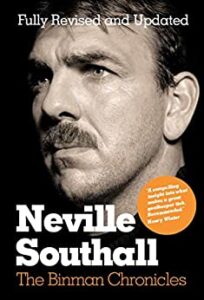 Past: Since being founded in 1878, Everton have a rich footballing history, including being part of the Football League from its inception in 1888 and champions first in 1891 and a further eight times, the most recent in 1987. Despite not having such successes in the Premier League, the Toffees have been mainstays throughout the league’s 29-year history. Unsurprisingly, therefore, there are a few Everton books knocking around, including Jim Keoghan’s look at nine players to have worn the number 9 shirt in Everton: Number Nine, Tony Evans’ Two Tribes and a forthcoming book to look out for The Forgotten Champions by Paul McParlan. When it comes to autobiographies, one man who’s missing from the list is Toffees legend, Duncan Ferguson, although Alan Pattullo’s 2015 book In Search of Duncan Ferguson is available. Whilst Peter Reid and Pat Nevin have both brought out entertaining autobiographies in recent years, Cheer Up Peter Reid and The Accidental Footballer respectively, they just miss out on the Premier League era, so the honour goes to goalkeeper and cult hero Neville Southall. Aside from an earlier autobiography, grippingly titled The Binman Chronicles, Southall brought out a second book last year called Mind Games, which explores the important subject of mental health.
Past: Since being founded in 1878, Everton have a rich footballing history, including being part of the Football League from its inception in 1888 and champions first in 1891 and a further eight times, the most recent in 1987. Despite not having such successes in the Premier League, the Toffees have been mainstays throughout the league’s 29-year history. Unsurprisingly, therefore, there are a few Everton books knocking around, including Jim Keoghan’s look at nine players to have worn the number 9 shirt in Everton: Number Nine, Tony Evans’ Two Tribes and a forthcoming book to look out for The Forgotten Champions by Paul McParlan. When it comes to autobiographies, one man who’s missing from the list is Toffees legend, Duncan Ferguson, although Alan Pattullo’s 2015 book In Search of Duncan Ferguson is available. Whilst Peter Reid and Pat Nevin have both brought out entertaining autobiographies in recent years, Cheer Up Peter Reid and The Accidental Footballer respectively, they just miss out on the Premier League era, so the honour goes to goalkeeper and cult hero Neville Southall. Aside from an earlier autobiography, grippingly titled The Binman Chronicles, Southall brought out a second book last year called Mind Games, which explores the important subject of mental health.
Present: After his impressive outing at the Euros this summer, it is hard to look beyond another goalkeeper when it comes to picking a future autobiography. Indeed, Jordan Pickford has been England’s number one for both a World Cup and Euros campaign, getting to a semi-final and final respectively, and is about to embark on his fourth season with Everton. World Cup Golden Boot winner James Rodriguez and Brazilian midfielder Allan’s journeys both take them from South America to Europe before their moves to Everton, similarly for Yerry Mina. Meanwhile, having already made a name for himself in the league, Richarlison spent the summer winning Olympic gold in Tokyo. However, if there is one player that has Everton running through him and defines the club’s recent past it is perennial defender Seamus Coleman, who is now in his twelfth year with the Toffees – only West Ham’s Mark Noble has a longer stay at a single club of the current Premier League crop. Having started out in his home nation with Sligo Rovers, Coleman’s commitment to Everton has been unwavering, seeing him surpass 300 appearances for the club, as well as being a mainstay for the national side. Fans from other teams will wish some of their players showed the loyalty Coleman has.
Leeds United
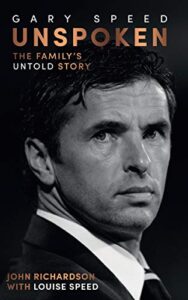 Past: As the Premier League era kicked off, Leeds United were a mainstay for the first decade, regularly securing European football, but in 2004 the club were relegated to the Championship and worse was to follow just three short seasons later, when a second relegation landed them in League One. Back-to-back play-offs followed before Leeds moved back up to the Championship in 2010, where lower-half finishes were the order of the day, that is until new chairman Andrea Radrizzani pulled off perhaps the most unexpected and spectacular signing, bringing one Marcelo Bielsa to Yorkshire. In the Argentine’s first season, Leeds just missed out on promotion, but despite a COVID-ravaged second season, his team finished the job, earning promotion back to the top flight for the first time in sixteen seasons. Last season saw their impressive form continue and this current crop follow in the footsteps of some Leeds legends of yore. Somewhat surprisingly, players like Nigel Martyn, Lucas Radebe, Ian Harte, Harry Kewell, Mark Viduka and Tony Yeboah are without autobiographies, whilst former players James Milner and David Batty are two of the few to have published books. However, there are few more important books than Gary Speed: Unspoken, which was published by the late-midfielder’s family, following his tragic death.
Past: As the Premier League era kicked off, Leeds United were a mainstay for the first decade, regularly securing European football, but in 2004 the club were relegated to the Championship and worse was to follow just three short seasons later, when a second relegation landed them in League One. Back-to-back play-offs followed before Leeds moved back up to the Championship in 2010, where lower-half finishes were the order of the day, that is until new chairman Andrea Radrizzani pulled off perhaps the most unexpected and spectacular signing, bringing one Marcelo Bielsa to Yorkshire. In the Argentine’s first season, Leeds just missed out on promotion, but despite a COVID-ravaged second season, his team finished the job, earning promotion back to the top flight for the first time in sixteen seasons. Last season saw their impressive form continue and this current crop follow in the footsteps of some Leeds legends of yore. Somewhat surprisingly, players like Nigel Martyn, Lucas Radebe, Ian Harte, Harry Kewell, Mark Viduka and Tony Yeboah are without autobiographies, whilst former players James Milner and David Batty are two of the few to have published books. However, there are few more important books than Gary Speed: Unspoken, which was published by the late-midfielder’s family, following his tragic death.
Present: England fans found themselves a new hero this season in the form of Kalvin Phillips, who stepped up onto the international stage at his first major championship like the proverbial duck to water. Still only 25, there’s plenty more yet to come from the Leeds-born lad who has been at the club for over a decade. Other long-serving players include captain Liam Cooper, right-back Luke Ayling and the versatile Stuart Dallas, all of whom have experienced the club’s startling revival in recent years. And it would be remiss not to mention Patrick Bamford, whose Premier League career, after being let go from Chelsea after five years and six loan spells, variously at MK Dons through to Burnley, was quick to be written off in some quarters when he moved to Middlesbrough in 2017. His move to Leeds a year later though proved his best yet as he was integral to the club’s promotion and he then went on to score in his first game on his return to the top flight, going on to rack up 17 goals – joint fourth with Son Heung-Min, and only behind Bruno Fernandes, Mo Salah and Harry Kane. Key to Bamford’s and Leeds’ success has without doubt, though, been the mercurial Argentinian manager, who has developed something of a cult following. And if there is anyone whose autobiography I’d like to read it’s Marcelo Bielsa’s.
Leicester City
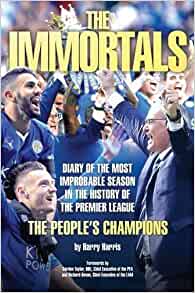 Past: The greatest underdog story of recent history was completed by the Foxes in 2016, when at odds of 5000-1, Claudio Ranieri led the likes of Wes Morgan, N’Golo Kane, Shinji Okazaki and Jamie Vardy to the Premier League title, for the first time in the club’s history. Leicester City firmly placed themselves on the footballing map and have continued to compete, as demonstrated last season, winning the FA Cup for the first time, and kicking the new season off with a trophy in last weekend’s Community Shield. Whilst Harry Harris’s The Immortals charts that incredible season, Rob Tanner’s updated 5000/1 is due out next month. Jamie Vardy’s story from non-league to Premier League winner has already been penned in his 2016 autobiography, and there is even a film about his life in the works. With a lot of the 2016 heroes still playing, further books will surely follow when they come to hang up their boots, but in terms of other autobiographies already available, Emile Heskey published his first book in 2019, whilst Muzzy Izzet’s eight-year spell at the club from 1996 to 2004 covered a tumultuous period which saw the team relegated from the Premier League, before bouncing straight back and then being relegated straight after.
Past: The greatest underdog story of recent history was completed by the Foxes in 2016, when at odds of 5000-1, Claudio Ranieri led the likes of Wes Morgan, N’Golo Kane, Shinji Okazaki and Jamie Vardy to the Premier League title, for the first time in the club’s history. Leicester City firmly placed themselves on the footballing map and have continued to compete, as demonstrated last season, winning the FA Cup for the first time, and kicking the new season off with a trophy in last weekend’s Community Shield. Whilst Harry Harris’s The Immortals charts that incredible season, Rob Tanner’s updated 5000/1 is due out next month. Jamie Vardy’s story from non-league to Premier League winner has already been penned in his 2016 autobiography, and there is even a film about his life in the works. With a lot of the 2016 heroes still playing, further books will surely follow when they come to hang up their boots, but in terms of other autobiographies already available, Emile Heskey published his first book in 2019, whilst Muzzy Izzet’s eight-year spell at the club from 1996 to 2004 covered a tumultuous period which saw the team relegated from the Premier League, before bouncing straight back and then being relegated straight after.
Present: Leicester are blessed with some really exciting young talent in the likes of Caglar Soyuncu, James Maddison and new arrival Patson Daka, and but for a horrific preseason injury that has put him on the sidelines for the time being, Wesley Fofana was sure to have followed up an impressive first season last time out. Old hands like Marc Albrighton and Ricardo Pereira have been around the footballing block and have plenty of experience to show for it, whilst Jonny Evans’ story includes eleven trophies from his time at Manchester United. Meanwhile, you’d be forgiven for thinking Youri Tielemans and Kelechi Iheanacho were older than their mere 24 years, having been in and around the Premier League for several seasons, but both have already made their mark and still have plenty of years ahead. Ten years their senior, Kasper Schmeichel has been at the club a decade and almost as long with the Denmark national team. As one of those who lifted the trophy in 2016 and has been there for Leicester’s incredible journey in recent years, as well as being at the centre of Denmark’s inspiring run at this summer’s Euros, Schmeichel’s autobiography would be one worth reading.
 Rebirth of the Blues is the third instalment in Neil Fitzsimon’s acclaimed trilogy on Chelsea FC.
Rebirth of the Blues is the third instalment in Neil Fitzsimon’s acclaimed trilogy on Chelsea FC.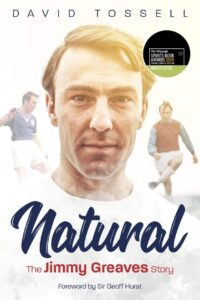 Jimmy Greaves remains the greatest goalscorer in English football history, with a record of 357 top-flight goals that may never be surpassed.
Jimmy Greaves remains the greatest goalscorer in English football history, with a record of 357 top-flight goals that may never be surpassed.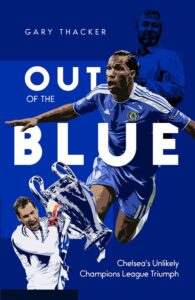 By the early months of 2012, it was clear that the appointment of Andre Villas-Boas as head coach at Chelsea wasn’t delivering the required success. Instead, the club was spiralling towards its worst season of the Roman Abramovich era.
By the early months of 2012, it was clear that the appointment of Andre Villas-Boas as head coach at Chelsea wasn’t delivering the required success. Instead, the club was spiralling towards its worst season of the Roman Abramovich era.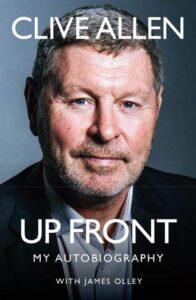 Clive Allen is one of the finest goalscorers of his generation but arguably his biggest battle has been to prove himself the best in his own family.
Clive Allen is one of the finest goalscorers of his generation but arguably his biggest battle has been to prove himself the best in his own family. ‘I want to play there. I want to be a Gunner,’ writes Olivier Giroud on his decision to join Arsenal from Montpellier in 2012 in his autobiography, Always Believe – words that epitomise not only why the Frenchman became a firm favourite in North London but also his determination and commitment to the shirt – in this case Arsenal, but before that Grenoble, Istres, Tours, Montpellier and later Chelsea, AC Milan and, of course, France. Yet, Giroud is perhaps one of the most undervalued, underrated and underplayed of modern footballers. I say that admittedly as an Arsenal fan for whom Giroud is amongst my favourite ever players, but it is also based on the fact that he sits in the top 10 of Premier League goalscorers for Arsenal, for headed Premier League goals and goal-scoring subs. He is a player who can be relied up on, who has delivered when it matters and always does a job for his team. Having not really followed his story off the pitch away from England, I was not too familiar with his background or journey so was hugely excited to read this autobiography.
‘I want to play there. I want to be a Gunner,’ writes Olivier Giroud on his decision to join Arsenal from Montpellier in 2012 in his autobiography, Always Believe – words that epitomise not only why the Frenchman became a firm favourite in North London but also his determination and commitment to the shirt – in this case Arsenal, but before that Grenoble, Istres, Tours, Montpellier and later Chelsea, AC Milan and, of course, France. Yet, Giroud is perhaps one of the most undervalued, underrated and underplayed of modern footballers. I say that admittedly as an Arsenal fan for whom Giroud is amongst my favourite ever players, but it is also based on the fact that he sits in the top 10 of Premier League goalscorers for Arsenal, for headed Premier League goals and goal-scoring subs. He is a player who can be relied up on, who has delivered when it matters and always does a job for his team. Having not really followed his story off the pitch away from England, I was not too familiar with his background or journey so was hugely excited to read this autobiography. Past: Arsenal have had some mighty fine players in the Premier League era and some mighty memorable personalities too – a number of which have made their mark in the publishing world. Legends like Sol Campbell, Ian Wright and Dennis Bergkamp have put pen to paper, although, perhaps Arsenal’s greatest Premier League player, Thierry Henry, has never done so, with just Philippe Auclair’s biography,
Past: Arsenal have had some mighty fine players in the Premier League era and some mighty memorable personalities too – a number of which have made their mark in the publishing world. Legends like Sol Campbell, Ian Wright and Dennis Bergkamp have put pen to paper, although, perhaps Arsenal’s greatest Premier League player, Thierry Henry, has never done so, with just Philippe Auclair’s biography,  Past: In the first ever Premier League season, Aston Villa finished second – it proved to be their highest-ever finish in the new top flight as subsequent seasons, and particularly more recent years, have been more down than up. Yet, Villa Park has been graced by some genuine quality and a few iconic cult heroes in the three decades of the Premier League. Surprisingly, though, few of these have had their stories put down on paper. Indeed, the likes of Villa stalwarts such as Mark Bosnich, Ian Taylor and Dean Saunders remain absent from the bookshelves, as do unexpected heroes like John Carew, Savo Milosevic and Juan Pablo Angel. In fact, only a couple of Villa players have autobiographies to their name, including nineties legend Paul McGrath, whilst more recent icon, Stiliyan Petrov, published his autobiography in 2005, prior to his move from Celtic to the West Midlands. So it’s sadly slim pickings, so I’m going to suggest three past players who publishers should consider for future autobiographies: Gareth Barry, who remains top of Villa’s most EPL appearances chart; Lee Hendrie, who rose up the ranks at his local club; and Dion Dublin, who needs no introduction.
Past: In the first ever Premier League season, Aston Villa finished second – it proved to be their highest-ever finish in the new top flight as subsequent seasons, and particularly more recent years, have been more down than up. Yet, Villa Park has been graced by some genuine quality and a few iconic cult heroes in the three decades of the Premier League. Surprisingly, though, few of these have had their stories put down on paper. Indeed, the likes of Villa stalwarts such as Mark Bosnich, Ian Taylor and Dean Saunders remain absent from the bookshelves, as do unexpected heroes like John Carew, Savo Milosevic and Juan Pablo Angel. In fact, only a couple of Villa players have autobiographies to their name, including nineties legend Paul McGrath, whilst more recent icon, Stiliyan Petrov, published his autobiography in 2005, prior to his move from Celtic to the West Midlands. So it’s sadly slim pickings, so I’m going to suggest three past players who publishers should consider for future autobiographies: Gareth Barry, who remains top of Villa’s most EPL appearances chart; Lee Hendrie, who rose up the ranks at his local club; and Dion Dublin, who needs no introduction. Past: As we head into the 2021/22 season, Brentford are the only team never to have previously played in the Premier League since its inception in 1992, having bounced around the old Second and Third Division, League One and League Two and spent the last seven seasons in the Championship, coming close to promotion in 2019/20, before securing their spot in the top flight last season. There are, unsurprisingly, therefore few books charting Brentford players past, although Greville Waterman has penned a couple of tomes on the club and its players, while The Official Brentford Book of Griffin Park was released in 2019, to mark their move from the stadium the Bees have called home for over 100 years. There’s rich pickings then for any wannabe authors out there or publishers who want to fill the Brentford gaps on the bookshelves.
Past: As we head into the 2021/22 season, Brentford are the only team never to have previously played in the Premier League since its inception in 1992, having bounced around the old Second and Third Division, League One and League Two and spent the last seven seasons in the Championship, coming close to promotion in 2019/20, before securing their spot in the top flight last season. There are, unsurprisingly, therefore few books charting Brentford players past, although Greville Waterman has penned a couple of tomes on the club and its players, while The Official Brentford Book of Griffin Park was released in 2019, to mark their move from the stadium the Bees have called home for over 100 years. There’s rich pickings then for any wannabe authors out there or publishers who want to fill the Brentford gaps on the bookshelves. Past: When the Premier League kicked off in earnest, Brighton and Hove Albion were struggling in Division 2, before a period in Division 3. Their fortunes seemed to turn with the new millennium, but as near back as 2011, they were still competing in League One. A few years in the Championship culminated in 2017 in their first promotion to the Premier League, and since then they haven’t looked back. The Premier League era has seen some stalwarts at the South Coast side, but none of these, including second on Brighton’s goalscoring charts, Glenn Murray, and joint sixth, Bobby Zamora, as well as talisman Bruno, have turned their journeys into books so far. The club’s leading goalscorer, Tommy Cook, who was also notable for being a first-class cricketer for Sussex way back in the 1920s and 1930s, was memorialised earlier this year in Tommy Cook: The Double Life of Superstar Sportsman, but for a more recent tome, albeit prior to the Premier League era, the autobiography of Brian Horton, who both played and managed at Brighton stands out.
Past: When the Premier League kicked off in earnest, Brighton and Hove Albion were struggling in Division 2, before a period in Division 3. Their fortunes seemed to turn with the new millennium, but as near back as 2011, they were still competing in League One. A few years in the Championship culminated in 2017 in their first promotion to the Premier League, and since then they haven’t looked back. The Premier League era has seen some stalwarts at the South Coast side, but none of these, including second on Brighton’s goalscoring charts, Glenn Murray, and joint sixth, Bobby Zamora, as well as talisman Bruno, have turned their journeys into books so far. The club’s leading goalscorer, Tommy Cook, who was also notable for being a first-class cricketer for Sussex way back in the 1920s and 1930s, was memorialised earlier this year in Tommy Cook: The Double Life of Superstar Sportsman, but for a more recent tome, albeit prior to the Premier League era, the autobiography of Brian Horton, who both played and managed at Brighton stands out. Past: Like Brentford and Brighton before them, Burnley were well out of the Premier League reckoning when it all kicked off in 1992. Bouncing around Division 1 and 2 throughout the nineties, the new millennium saw them consolidate in Division 1, latterly the Championship, before making the final step up the pyramid to the Premiership via the play-off in 2009. It was but the briefest of stays and was repeated in 2013/14 when the Clarets were once more promoted only to be relegated after their first season back at the top. However, since winning the Championship in 2016, Burnley have become a mainstay of England’s top league. Dave Thomas has been at the forefront of charting Burnley’s recent past, including Champions: How Burnley won promotion 2015/2016 and a biography of Bob Lord of Burnley, described as football’s most controversial chairman. So when it comes to the players, it’s another Dave Thomas offering that is worth a look – Paul Weller’s Not Such a Bad Life.
Past: Like Brentford and Brighton before them, Burnley were well out of the Premier League reckoning when it all kicked off in 1992. Bouncing around Division 1 and 2 throughout the nineties, the new millennium saw them consolidate in Division 1, latterly the Championship, before making the final step up the pyramid to the Premiership via the play-off in 2009. It was but the briefest of stays and was repeated in 2013/14 when the Clarets were once more promoted only to be relegated after their first season back at the top. However, since winning the Championship in 2016, Burnley have become a mainstay of England’s top league. Dave Thomas has been at the forefront of charting Burnley’s recent past, including Champions: How Burnley won promotion 2015/2016 and a biography of Bob Lord of Burnley, described as football’s most controversial chairman. So when it comes to the players, it’s another Dave Thomas offering that is worth a look – Paul Weller’s Not Such a Bad Life.
 Past: As Crystal Palace head into the new season, it’s all change at the top, with Roy Hodgson stepping away and Patrick Vieira taking up the reins for his first term in charge in the Premier League, and they’ll be big shoes to fill after the former England man made Palace a firm Premier League outfit. Whilst the Eagles were part of the Premier League from the get-go, they hold the dubious honour of being one of the three teams to be relegated in that inaugural season (quiz-goers out there, two points if you were able to name Middlesbrough and Notts Forest as the other two teams to fall), and despite briefly yo-yoing back to the top flight, the majority of the nineties and noughties were spent in Division 1/Championship. In 2013, however, Crystal Palace once again returned to England’s top division and have stayed there ever since. When it comes to autobiographies, Vince Hilaire’s autobiography published in 2018 offers a pre-Premier League take, whilst Mark Bright’s My Story similarly just misses out on the new era but both are ones to look out for. For something a bit different though, and to get another side of the Premier League story, Simon Jordan’s Be Careful What You Wish For was a finalist for both the William Hill Sports Book of the Year and shortlisted for the British Sports Book Award for best autobiography. And surely Sky Sports pundit Clinton Morrison’s memoir can’t be too far off.
Past: As Crystal Palace head into the new season, it’s all change at the top, with Roy Hodgson stepping away and Patrick Vieira taking up the reins for his first term in charge in the Premier League, and they’ll be big shoes to fill after the former England man made Palace a firm Premier League outfit. Whilst the Eagles were part of the Premier League from the get-go, they hold the dubious honour of being one of the three teams to be relegated in that inaugural season (quiz-goers out there, two points if you were able to name Middlesbrough and Notts Forest as the other two teams to fall), and despite briefly yo-yoing back to the top flight, the majority of the nineties and noughties were spent in Division 1/Championship. In 2013, however, Crystal Palace once again returned to England’s top division and have stayed there ever since. When it comes to autobiographies, Vince Hilaire’s autobiography published in 2018 offers a pre-Premier League take, whilst Mark Bright’s My Story similarly just misses out on the new era but both are ones to look out for. For something a bit different though, and to get another side of the Premier League story, Simon Jordan’s Be Careful What You Wish For was a finalist for both the William Hill Sports Book of the Year and shortlisted for the British Sports Book Award for best autobiography. And surely Sky Sports pundit Clinton Morrison’s memoir can’t be too far off. Past: Since being founded in 1878, Everton have a rich footballing history, including being part of the Football League from its inception in 1888 and champions first in 1891 and a further eight times, the most recent in 1987. Despite not having such successes in the Premier League, the Toffees have been mainstays throughout the league’s 29-year history. Unsurprisingly, therefore, there are a few Everton books knocking around, including Jim Keoghan’s look at nine players to have worn the number 9 shirt in Everton: Number Nine, Tony Evans’ Two Tribes and a forthcoming book to look out for The Forgotten Champions by Paul McParlan. When it comes to autobiographies, one man who’s missing from the list is Toffees legend, Duncan Ferguson, although Alan Pattullo’s 2015 book In Search of Duncan Ferguson is available. Whilst Peter Reid and Pat Nevin have both brought out entertaining autobiographies in recent years, Cheer Up Peter Reid and The Accidental Footballer respectively, they just miss out on the Premier League era, so the honour goes to goalkeeper and cult hero Neville Southall. Aside from an earlier autobiography, grippingly titled The Binman Chronicles, Southall brought out a second book last year called Mind Games, which explores the important subject of mental health.
Past: Since being founded in 1878, Everton have a rich footballing history, including being part of the Football League from its inception in 1888 and champions first in 1891 and a further eight times, the most recent in 1987. Despite not having such successes in the Premier League, the Toffees have been mainstays throughout the league’s 29-year history. Unsurprisingly, therefore, there are a few Everton books knocking around, including Jim Keoghan’s look at nine players to have worn the number 9 shirt in Everton: Number Nine, Tony Evans’ Two Tribes and a forthcoming book to look out for The Forgotten Champions by Paul McParlan. When it comes to autobiographies, one man who’s missing from the list is Toffees legend, Duncan Ferguson, although Alan Pattullo’s 2015 book In Search of Duncan Ferguson is available. Whilst Peter Reid and Pat Nevin have both brought out entertaining autobiographies in recent years, Cheer Up Peter Reid and The Accidental Footballer respectively, they just miss out on the Premier League era, so the honour goes to goalkeeper and cult hero Neville Southall. Aside from an earlier autobiography, grippingly titled The Binman Chronicles, Southall brought out a second book last year called Mind Games, which explores the important subject of mental health. Past: As the Premier League era kicked off, Leeds United were a mainstay for the first decade, regularly securing European football, but in 2004 the club were relegated to the Championship and worse was to follow just three short seasons later, when a second relegation landed them in League One. Back-to-back play-offs followed before Leeds moved back up to the Championship in 2010, where lower-half finishes were the order of the day, that is until new chairman Andrea Radrizzani pulled off perhaps the most unexpected and spectacular signing, bringing one Marcelo Bielsa to Yorkshire. In the Argentine’s first season, Leeds just missed out on promotion, but despite a COVID-ravaged second season, his team finished the job, earning promotion back to the top flight for the first time in sixteen seasons. Last season saw their impressive form continue and this current crop follow in the footsteps of some Leeds legends of yore. Somewhat surprisingly, players like Nigel Martyn, Lucas Radebe, Ian Harte, Harry Kewell, Mark Viduka and Tony Yeboah are without autobiographies, whilst former players James Milner and David Batty are two of the few to have published books. However, there are few more important books than Gary Speed: Unspoken, which was published by the late-midfielder’s family, following his tragic death.
Past: As the Premier League era kicked off, Leeds United were a mainstay for the first decade, regularly securing European football, but in 2004 the club were relegated to the Championship and worse was to follow just three short seasons later, when a second relegation landed them in League One. Back-to-back play-offs followed before Leeds moved back up to the Championship in 2010, where lower-half finishes were the order of the day, that is until new chairman Andrea Radrizzani pulled off perhaps the most unexpected and spectacular signing, bringing one Marcelo Bielsa to Yorkshire. In the Argentine’s first season, Leeds just missed out on promotion, but despite a COVID-ravaged second season, his team finished the job, earning promotion back to the top flight for the first time in sixteen seasons. Last season saw their impressive form continue and this current crop follow in the footsteps of some Leeds legends of yore. Somewhat surprisingly, players like Nigel Martyn, Lucas Radebe, Ian Harte, Harry Kewell, Mark Viduka and Tony Yeboah are without autobiographies, whilst former players James Milner and David Batty are two of the few to have published books. However, there are few more important books than Gary Speed: Unspoken, which was published by the late-midfielder’s family, following his tragic death. Past: The greatest underdog story of recent history was completed by the Foxes in 2016, when at odds of 5000-1, Claudio Ranieri led the likes of Wes Morgan, N’Golo Kane, Shinji Okazaki and Jamie Vardy to the Premier League title, for the first time in the club’s history. Leicester City firmly placed themselves on the footballing map and have continued to compete, as demonstrated last season, winning the FA Cup for the first time, and kicking the new season off with a trophy in last weekend’s Community Shield. Whilst Harry Harris’s The Immortals charts that incredible season, Rob Tanner’s updated 5000/1 is due out next month. Jamie Vardy’s story from non-league to Premier League winner has already been penned in his 2016 autobiography, and there is even a film about his life in the works. With a lot of the 2016 heroes still playing, further books will surely follow when they come to hang up their boots, but in terms of other autobiographies already available, Emile Heskey published his first book in 2019, whilst Muzzy Izzet’s eight-year spell at the club from 1996 to 2004 covered a tumultuous period which saw the team relegated from the Premier League, before bouncing straight back and then being relegated straight after.
Past: The greatest underdog story of recent history was completed by the Foxes in 2016, when at odds of 5000-1, Claudio Ranieri led the likes of Wes Morgan, N’Golo Kane, Shinji Okazaki and Jamie Vardy to the Premier League title, for the first time in the club’s history. Leicester City firmly placed themselves on the footballing map and have continued to compete, as demonstrated last season, winning the FA Cup for the first time, and kicking the new season off with a trophy in last weekend’s Community Shield. Whilst Harry Harris’s The Immortals charts that incredible season, Rob Tanner’s updated 5000/1 is due out next month. Jamie Vardy’s story from non-league to Premier League winner has already been penned in his 2016 autobiography, and there is even a film about his life in the works. With a lot of the 2016 heroes still playing, further books will surely follow when they come to hang up their boots, but in terms of other autobiographies already available, Emile Heskey published his first book in 2019, whilst Muzzy Izzet’s eight-year spell at the club from 1996 to 2004 covered a tumultuous period which saw the team relegated from the Premier League, before bouncing straight back and then being relegated straight after.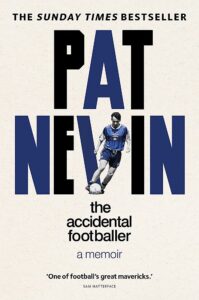 Depending on your age and interests, Pat Nevin is either an ex-Scottish International footballer and Chelsea legend, a DJ much influenced by the indie music scene or a respected media journalist and writer. One man, many facets and with a story to tell. Much like the release of Arsene Wenger’s autobiography, My Life in Red and White, Pat Nevin’s book was also keenly anticipated by many in the sporting world and beyond. And like the ex-Arsenal manager’s offering, Pat Nevin’s The Accidental Footballer is a book that has a sophistication, insight, depth and humour that is not always associated with the genre of football writing.
Depending on your age and interests, Pat Nevin is either an ex-Scottish International footballer and Chelsea legend, a DJ much influenced by the indie music scene or a respected media journalist and writer. One man, many facets and with a story to tell. Much like the release of Arsene Wenger’s autobiography, My Life in Red and White, Pat Nevin’s book was also keenly anticipated by many in the sporting world and beyond. And like the ex-Arsenal manager’s offering, Pat Nevin’s The Accidental Footballer is a book that has a sophistication, insight, depth and humour that is not always associated with the genre of football writing. For those young ‘uns brought up on the misleading title ‘Champions’ League’, it might come as a surprise to learn that the European Cup Winners’ Cup actually was a cup competition between European teams who had won their own domestic cup finals, not just another chance for the top clubs to keep on playing each other and guarantee income streams.
For those young ‘uns brought up on the misleading title ‘Champions’ League’, it might come as a surprise to learn that the European Cup Winners’ Cup actually was a cup competition between European teams who had won their own domestic cup finals, not just another chance for the top clubs to keep on playing each other and guarantee income streams.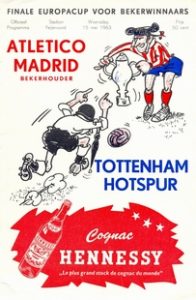 The most memorable of the early finals was Tottenham’s 5-1 thumping in 1963 of Atletico Madrid, winners the previous year. Two of the goals for Spurs were scored by the peerless Jimmy Greaves whose injury in the World Cup group stages probably cost him his place in the Final. No substitutes in those days, so a suited Greaves had to watch England’s historic win from the bench as a supporter. Spurs were the first British winners in Europe, and it was a fitting reward, and swansong, for a team who had done the domestic ‘double’ in 1961 – the first time by any club in 64 years.
The most memorable of the early finals was Tottenham’s 5-1 thumping in 1963 of Atletico Madrid, winners the previous year. Two of the goals for Spurs were scored by the peerless Jimmy Greaves whose injury in the World Cup group stages probably cost him his place in the Final. No substitutes in those days, so a suited Greaves had to watch England’s historic win from the bench as a supporter. Spurs were the first British winners in Europe, and it was a fitting reward, and swansong, for a team who had done the domestic ‘double’ in 1961 – the first time by any club in 64 years. The last match with strong links to the World Cup Final was, understandably enough, the Final in May 1966 where Liverpool lost 2-1 after extra time to Borussia Dortmund, a kind of England v West Germany rehearsal. Kind of. Roger Hunt would go on two months later to turn the tables on the three Dortmund players selected for their nation in the Final; Tilkowski, Emmerich and Held. Hunt is famous for doing absolutely nothing in the World Cup Final except turn away to celebrate Hurst’s ‘was it over the line’ goal.
The last match with strong links to the World Cup Final was, understandably enough, the Final in May 1966 where Liverpool lost 2-1 after extra time to Borussia Dortmund, a kind of England v West Germany rehearsal. Kind of. Roger Hunt would go on two months later to turn the tables on the three Dortmund players selected for their nation in the Final; Tilkowski, Emmerich and Held. Hunt is famous for doing absolutely nothing in the World Cup Final except turn away to celebrate Hurst’s ‘was it over the line’ goal.